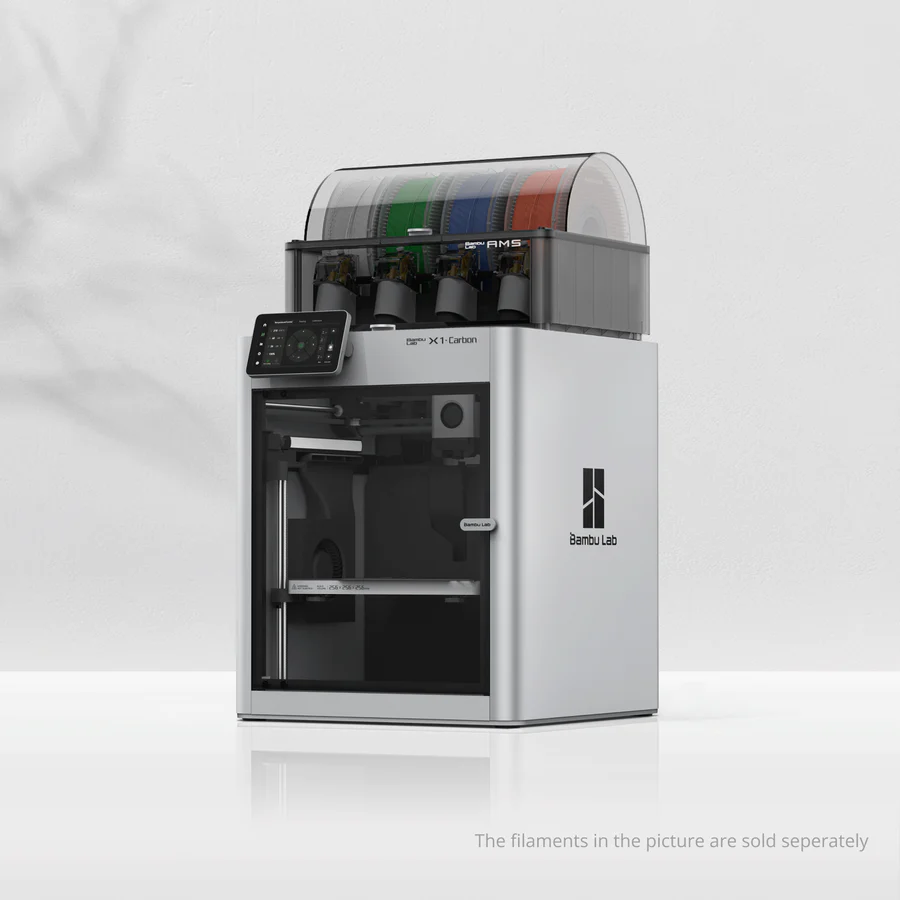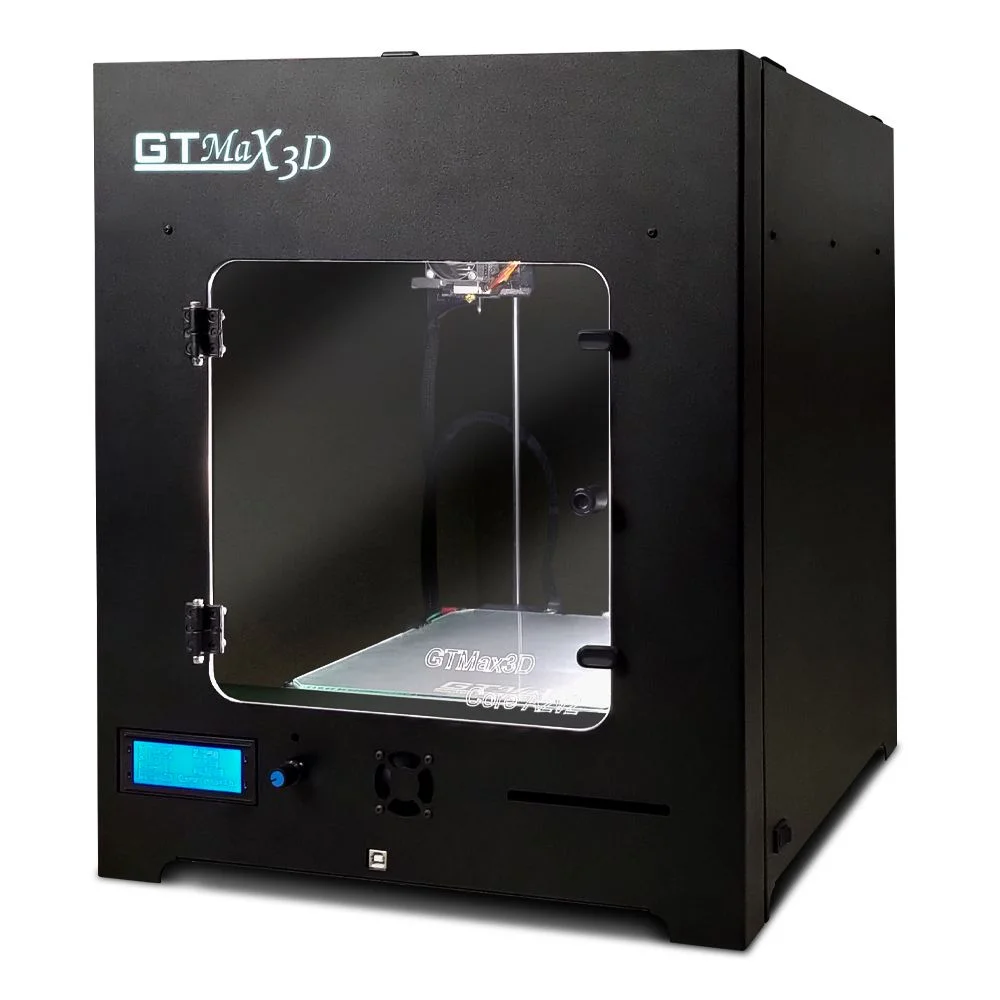Compare X1 carbon vs Core A2V2
Comparison between the best 3D printers
Choose the best 3D printer at the best price. The cheapest 3D printers are here.
Buy a 3D printer here with 3D Fila.
 |
 |
|
| Model | X1 carbon |
Core A2V2 |
| Printing Material | Filament | Filament |
| Buy Filament for Bambu Lab X1 carbon | Buy Filament forGTMax Core A2V2 | |
| Estimated price | $1449,00 | $684,00 |
| Manufacturer | Bambu Lab | GTMax |
| Release Year | 2023 | 2019 |
| Print Volume [mm] | 256x256x256 | 220x220x240 |
| Printer Size [mm] | 389x389x457 | 425x460x512 |
| Weight [kg] | 14,13 | |
| Power Loss Recovery | YES | YES |
| Enclosed printer | YES | YES |
| Bed Leveling | Automatic | |
| Filament End Sensor | YES | YES |
| Bed type | Heated | Heated |
| Power supply system | Direct Drive | Bowden |
| Standard nozzle | 0,4 | 0,4 |
| Maximum Nozzle Temperature [°C] | 300 | 295 |
| Maximum Bed Temperature [°C] | 120 | 135 |
| Maximum printing speed [mm/s] | 500 | 150 |
| Filament holder | YES | YES |
| Camera for supervision | YES | YES |
| Recommended filaments | PLA, PETG, TPU, PVA, PA, PA-CF, Nylon, PC | PLA, PETG, Tritan, Flex, ABS |
| Recommended slicers | Bambu Studio, Super Slicer, Cura, Prusa Slicer, Orca | Cura, Simplify, Slic3r, IdeaMaker |
| Maximum Resolution [mm] | 0,1 | 0,05 |
| Processor | Quad ARM A7 1.2 GHz | |
| Display | Touchscreen 5'' | Mono |
| Power Supply | 350 W | |
| Connectivity | Wifi, Bambu bus, Cartão SD | SD / USB |
| Operating systems | Windows, Linux, Macbook | Windows, Mac, Linux |
| Date of registration in the system | 2024-04-10 | 2022-11-12 |
| Release date | 2023 | 2019 |
| Extra features | The Bambu Lab X1 Carbon revolutionizes 3D printing with stunning design, high print speeds, and a streamlined user experience. It stands out with its CoreXY system, a hotend capable of reaching 300°C, allowing for a wide range of filaments. Its LiDAR-assisted bed leveling system, vibration compensation, and AMS multicolor printing capability raise the industry standard. Print quality is impressive, with the ability to fine-tune for perfection. The X1 Carbon, with its closed build volume, not only promises but also delivers one of the most advanced 3D printing experiences available to consumers. | The GTMax3D ProCore A2v2 is a compact and robust 3D printer with a printing area of ??220 x 220 x 240 mm. It offers high print quality, ranging from 0.05 mm to 0.32 mm. Its features include automatic filament detection and changing, travel speed of up to 300 mm/s, and a heated aluminum bed with a glass top. It has automatic bed leveling with 16 points and an all-metal hotend that reaches up to 298°C. The printer has a carbon steel frame with electrostatic painting, is automatic bivolt and has connectivity via USB and SD card. The Bowden system and core xy kinematics complete its advanced features. |
| Support for multiple colors and materials (AMS and CFS) | YES | NO |
Notes * |
||
| Cost-benefit | 7 / 10 | 6 / 10 |
| Hardware | 6.4 / 10 | 2.5 / 10 |
| Tela | . | . |
| Print volume | 4 / 10 | 3 / 10 |
| Performance | 4 / 10 | 1 / 10 |
Conclusion |
| In comparing the Bambu Lab X1 Carbon and the GTMax Core A2V2, it's clear that both printers cater to different segments of the 3D printing market, each offering unique strengths and weaknesses. The Bambu Lab X1 Carbon is positioned as a high-end model, featuring advanced capabilities like a high maximum printing speed, exceptional print quality, and support for a wide range of filament types, including specialty materials. Its innovative technologies, such as LiDAR-assisted bed leveling and the AMS multi-color printing system, elevate the user experience and efficiency, making it ideal for users who prioritize performance, versatility, and cutting-edge features. Although it comes at a higher price point, the X1 Carbon offers excellent value through its superior hardware and print abilities, justifying the investment for dedicated hobbyists or professionals. In contrast, the GTMax Core A2V2, while more budget-friendly, still provides solid performance for those who are newer to 3D printing or those working on less demanding projects. It features essential capabilities like automatic bed leveling and a heated bed, and it produces quality prints, albeit at a slower speed compared to its competitor. Its lower cost makes it an attractive option for entry-level users or those who primarily work with common filament types without the need for advanced features. Overall, the choice between these two printers ultimately depends on user requirements and budget. If top-tier performance and advanced functionalities are paramount, the Bambu Lab X1 Carbon stands out as the superior choice. However, for those seeking a more economical option that still delivers reliable performance for everyday printing tasks, the GTMax Core A2V2 is a commendable alternative. Thus, buyers should evaluate their specific printing needs, experience level, and financial constraints when deciding between these two models. |

